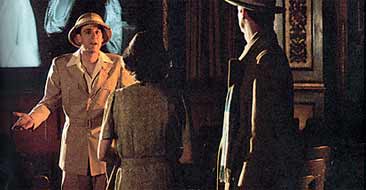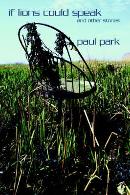I have a confession to make. I am not a blogger. I am actually a strange person who never learned to write and can barely even read. I live in a secret room somewhere in Brooklyn where I drink soda-pop, listen to Morrissey albums and think about a variety of topics. Deep inside my brain is a tiny chip which telepathically sends all my ideas to my various blog-bots, who in turn go and write my blogs for me. The blog-bots do the research, gather the images, and occasionally speak to science fiction authors. Recently, while I was at home watching a DVD, one of my blog-bots got a chance to speak to SF writer Paul Park on the subject of meta-fiction. This is what my blog-bot discovered.
For those unfamiliar with Paul Park’s work, he is the author of several books including Celestis, A Princess of Roumania, the short-story collection If Lions Could Speak and others. Recently his story “The Persistence of Memory, or This Space for Sale” was nominated for a World Fantasy Award. Last winter, a pseudo-SF memoir called “Ghosts Doing the Orange Dance” was published in The Magazine of Fantasy and Science Fiction. Though my blog-bot couldn’t be sure, it seems that Paul Park is real, and most likely, human. Many of his stories and novels are meta-fictional. Indeed, if his claims can be believed; he even teaches a course on the subject at Williams College. In any case, meta-fiction seems to have some kind of relationship to science fiction, and so the blog-bot asked “Paul Park” some questions in order to get to the bottom of this relationship.
The first thing Paul did was to define meta-fiction as “a style of writing where the act of writing the story becomes part of the story.” My telepathic chip beeped in my brain and then the blog-bot wondered aloud how this meta-fiction thing even came about. Park said that “painters were always reminding the audience that they were looking at paintings, and at a certain point fiction writers wanted to do that too…they wanted to assert that what you’re looking at is in fact a fictional construct.”
Despite the high sophistication of my blog-bot, it was still baffled by this form of fiction, and it wondered even more deeply if there was an intrinsic connection between meta-fiction and science fiction. To this, Paul said, “I think it’s no coincidence that people who are good at writing far-out fiction are also good at meta-fiction. Think of all the best Phillip K. Dick stories where you experience a sort of dislocation and suddenly what you think you’ve been reading is in fact something else entirely.” I then transmitted a thought to my blog-bot about the DVD I was watching at the time.

The movie was Woody Allen’s The Purple Rose of Cairo, a film in which a fictional character literally steps down from the screen and into the real world. Implicit in the existence of this character is that he is not human, and yet his reactions to the hardships of the real world seemed more honest than the characters around him. This got me thinking, so via the blog-bot I then posed another question to Paul Park: Because meta-fiction acknowledges the conceit that the reader/viewer is experiencing a story, is it more honest than “conventional” fiction?
“No,” Paul Park said, “Not more honest…[in my stories] I don’t use meta-fiction to tell frankly about my own experience, especially not my own experience in writing the story or conceiving of these experiences. The meta-fiction is just another level of artifice. Sometimes a writer “character” is just a projection of a person who is writing the story, but not necessarily “me.” Meta-fiction doesn’t depend on the illusion that you’re reading about real people.”

Many of the protagonists of Paul Park stories are writers. This is notable in his story “Untitled 4.” In this story, a writer has been imprisoned for writing a book called The Thirteen Steps, a book that changed the world. I secretly hope that the Thirteen Steps is itself also a meta-fictional book! In his story “If Lions Could Speak: Imagining the Alien” the reader is given a piece of writing which intially appears to be a non-fiction essay on the nature of alien-beings in science fiction. Soon, the meta-fiction takes over, and by the end of the story we meet all sorts of strange creatures that seem to inhabit the “writer’s” psyche.
At this point, another one of my blog-bots started sending me telepathic images about the new Tron movie, which caused my brain implant to briefly over-load. When it clicked back on, the blog-bot interviewing Paul Park had moved on to new questions.
“In most regular stories,” the blog-bot said, “A reader roots for a protagonist because the character experiences some sort of hardship. Does making a protagonist a science fiction writer immediately give us more empathy for them?” Even though my blog-bot was getting cheeky, Paul Park laughed and said, “Yes, yes, I think that’s right.”
The blog-bot and Paul were really hitting it off now and I wondered, (as I often do) how much my little telepathic signals control the blog-bots and how much they control me. Park then pointed out that writers as main characters in science fiction are “very rare” and theorized that this probably had to do with old school science fiction writers being “ashamed” of not being good enough scientists. My blog-bot pointed out that the existence of Vonnegut’s Kilgore Trout seems to lend credence to such a theory.
“Modernist fiction is tied to problems of writers,” Paul said, “Self-glorifying. Existential struggle. This has not been a big part of genre writing.” This made sense to both me and the blog-bot and the conversation then turned towards the films of Charlie Kaufman, which while meta-fictional are also, arguably science fiction as well. In both Eternal Sunshine of the Spotless Mind and Being John Malkovich, a science fiction element drives the plot, while a meta-fictional element provides each movie with its theme. Not surprisingly, Paul Park is a big Charlie Kaufman fan.
As the conversation between Paul Park and the blog-bot started to wind down, the images in my mind became strange, and suddenly it appeared as though Paul Park had a tail. And not any tail, but a stegosaurus tail. Soon, as I watched through the telepathic link between myself and the blog-bot, Paul morphed into a stegosaurus lizard-person and got up to leave. Before he did, he mentioned to my blog-bot that “Ghosts Doing the Orange Dance” is being released as a stand-alone novella by Postscripts in the very near future. He also mentioned that he is expanding his science fiction memoir into a longer story. At this point, he sauntered away, his words unintelligible, as he was talking in some kind of alien-dinosaur-speak that even my blog-bot couldn’t decipher.
It’s a good thing I have the blog-bots. Reading is much easier when you get it via telepathic link. And if Paul Park knew the secret of the blog-bots, I’m sure he’d agree.
Now, where was I? Ah yes, The Purple Rose of Cairo.
Ryan Britt’s writing has appeared (via blog-bot) with Nerve.com, Clarkesworld Magazine, Opium Magazine and elsewhere. He is frequently uncertain if he is “flat” or “round” character which makes things hard when shopping for a good pair of pants.









